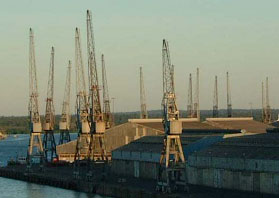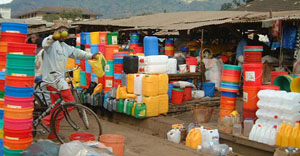|
|
 |
|
|
TUTAFIKA: Imagining our Future - Tanzania |
|
|
MIBAKA UCHUMI Mibaka Uchumi is a story of the capture of political and economic power by small groups of people motivated only by personal enrichment. In this story, these people are called the “Mibaka” – the Big Thieves. The story of Mibaka Uchumi begins with a sense of hope and optimism Real political power lies in the hands of a small clique that makes decisions and makes sure they are far from public scrutiny. This powerful group hands out public funds, jobs and other forms of patronage to the citizens in return for political support and obedience. Donors share the cost of this patronage through grants and loans. A tiny number of Africans, Asians and Europeans own the most productive economic assets such as banks, factories, mines, tourist resorts and farms. Foreign investors look to their governments for assistance to do business in Tanzania. They also forge further links with the most important business people in Tanzania who welcome the opportunity to expand their networks. Rich governments press for openness and transparency on behalf of their investors, but diminish their investments in social aid. In the world of Mibaka Uchumi, privatisation continues. Local businesses and foreign investors team up to buy the government-owned factories, plots and farms being sold. Ultimate control is retained by the foreign partners and a very small Tanzanian elite. A few Tanzanians occupy high p For a while, economic fortunes seem to improve for many. Small farmers are recruited into the Mibaka networks as suppliers of raw agricultural commodities such as cotton, cashew nuts and coffee. They earn a lot when prices are good. But fluctuations from year to year are common, leaving them with a very unpredictable source of income. No value is added to the agricultural crops in Tanzania as everything is exported raw to other destinations for processing. In the name of ‘efficiency’ and ‘value for money’, there is large-scale privatisation of social services. But the regulation of these privatised services is weak or absent and standards decline rapidly, with disastrous consequences for poor Tanzanians. However, the rich can afford to use private facilities and they continue to enjoy good health and education. Many things do not improve for most of us. Public investment in infrastructure is channelled to those sectors and regions with the greatest financial rewards for private investors. Infrastructure, which allows for access to the country’s natural resources, is developed and trade quickens. Other regions are ignored. Many of us continue to be burdened by HIV/AIDS, malaria and other diseases, sapping our energy for work and reducing our ability to earn our living. The benefits of regional and global trade agreements are exploited by the Mibaka, supported by foreign investors. Lucrative business opportunities are developed, primarily in the extractive industries - minerals, crude oil and natural gas. Concessions are granted to the highest ‘bidders’. Corruption and illegal practices are entrenched as the Mibaka take advantage of opportunities provided by the further opening up of the economy. A service industry emerges to meet the growing needs of this economy, but it too is largely controlled by the Mibaka and their partners. The attention of the politicians shifts from citizens to wealthy traders. The link between the people and their political leaders weakens as more and more people look to the Mibaka to help them survive. Politicians are also dependent on Mibaka money to help them win the periodic elections demanded by foreign donors. In exchange, the Mibaka seek concessions, access to mines and minerals, or preferential treatment in lucrative government contracts. As the marriage between politics and big money grows stronger, most of us are increasingly and effectively disenfranchised. Benefits do not trickle down and this leads to worsening social indicators and strong pressure on the poor and marginalised. Power shifts completely from the citizens to the Mibaka and their political partners. Foreigners manage the few profitable manufacturing activities, supported by their own governments, who remain as donors propping up marginal social services. Tanzanian elites concentrate on deal making and trading. As the gap between rich and poor grows, there is growing resentment of foreigners. Social unrest increases as the connection between economics and politics deepens, fuelling divisions along class, racial and religious lines. In the Mibaka Uchumi world, the utu net is used The outcome of the Mibaka Uchumi story is a state that is taken hostage by a small, but very powerful elite. The old state that once represented all of us is unable to assert itself. It is largely discredited, being identified with a small clique and outside interests. The country’s wealth is transferred abroad through repatriated profits, transfer pricing and other means. Social tension, born of a big and growing gap between rich and poor, and political impotence, contribute to growing instability. Low intensity unrest is a common phenomenon. The cost of maintaining peace and stability, vital for the continued success of the Mibaka increases dramatically. How long can this ‘stability’ be maintained? And at what human and material cost? |
|
| [Tutafika] [Intro to Scenarios] [Tanzania Today] [YaleYale] [Mibaka Uchumi] [Amka!] [Perspective] [About Tutafika] [Your comments] [About Tanzania] |
 . The economy is growing, imports are rising, and shelves are full. There are plenty of opportunities to exploit for those with money and connections.
. The economy is growing, imports are rising, and shelves are full. There are plenty of opportunities to exploit for those with money and connections. rofile but powerless directorships on the company boards, mostly for public relations. The privatisation of trade in agricultural commodities does not happen at all.
rofile but powerless directorships on the company boards, mostly for public relations. The privatisation of trade in agricultural commodities does not happen at all.
 to capture, compromise and corrupt. It ties us into relationships from which we cannot escape. Leaders are bought and the rest of us are indentured to the Mibaka. With so much economic and political power in a few hands, we all compete desperately for handouts from the Mibaka. The Mibaka are also captured in webs of obligation, which they increasingly resent. Eventually, the utu net loses its resilience, as its strength depends on very few people and their personal connections.
to capture, compromise and corrupt. It ties us into relationships from which we cannot escape. Leaders are bought and the rest of us are indentured to the Mibaka. With so much economic and political power in a few hands, we all compete desperately for handouts from the Mibaka. The Mibaka are also captured in webs of obligation, which they increasingly resent. Eventually, the utu net loses its resilience, as its strength depends on very few people and their personal connections.